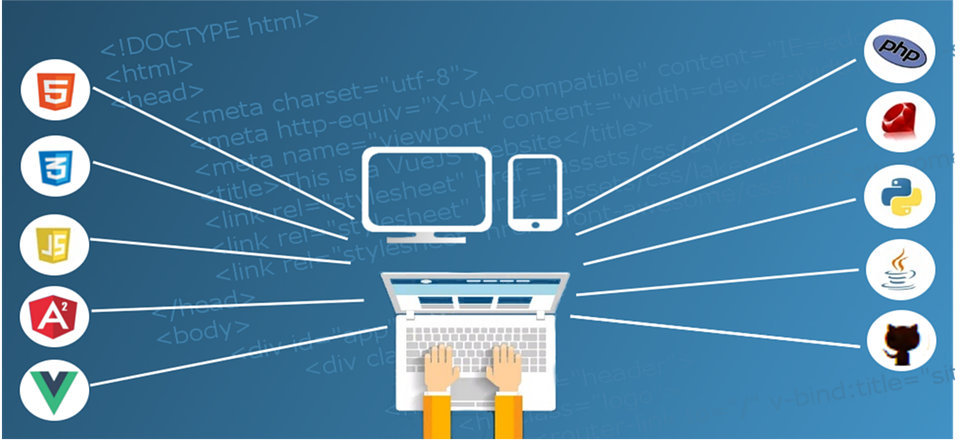Web Developer - As a career option

The story of web developers as one of the most indispensable assets of modern society began shortly before the bursting of the dot-com bubble in 2000 – 2001. People woke up to the limitless capacity of the internet for trade, information sharing, and socializing.
Companies all around the world made haste to form their internet footprints, and a decade and a half later, we’re here: as Stephen Hawking rightly said, "the internet is like a giant brain of which each of us is a neuron."
Web developers are the builders of the internet. They are people with the background and training to start from an empty coding screen and end up with a vast and sophisticated website. Look up “web development” on Google Trends, and you’ll be amazed at the amount of attention the discipline receives on a daily basis. For web developers, there literally is no time like the present!

How to Become a Web Developer?
Because of the versatility of the stream, there is no single and rigid way for you to zero in on web development as a career. However, the fact of the matter is that even though web developers need to possess a diverse skill set, the skill that takes the most time to develop and master is technical.
Hence, even though there is no hard and fast rule that you have to be a techie to be a web developer, IT professionals venturing into the area of web development find remarkably better prospects and make significantly higher sums of money.
The optimal route to being a successful web developer is, hence, to start by getting an engineering degree, preferably in Information Technology. To do a B.Tech in IT, your first step should be right after you clear class X and venture into higher studies: preparing for engineering entrances.

In India, the vast majority of engineering entrance exams take place from March through June i.e. immediately after your class XII board examinations.
Getting a great rank in an entrance and landing yourself a seat in an elite engineering college will go a long way towards ensuring your career as a web developer.
Just as in any other discipline, developers who come with a specialization tend to be more employable and find it easier to achieve success.
Hence, most web developers tend to complete one or more specialized training programs that deal with individual areas of web development.
What Does it Take To be a Web Developer?
Contrary to what you might think, the work of a web developer is far from cerebral technical work – it is a highly eclectic area of work that requires everything from mathematics to aesthetics.
However, because web development involves a significant amount of writing and looking at computer code, it is a big plus if you like coding or are otherwise driven by logical reasoning.
Eligibility Criteria to Become a Web Developer
- +2: Need to be in the science discipline and graduate with over 60% marks
- Bachelor’s Degree: Bachelor of Technology (B.Tech) in Information Technology preferred
- Master’s Degree: Not required; however, postgraduate diplomas on niche specializations are available
A Day in the Life of a Web Developer
Hi, I’m X, and I’m going to take you on a day’s trip to the fascinating and turbulent world of web development.
I’m a PHP developer and I work at one of the largest web design and development companies in the country. After my BE in Electronics Engineering, I spent two years working at an IT firm as a tech analyst. After that, I got certified as a programmer in PHP and am where I am today!
9:00 AM: I arrive at my workplace. It’s still early, but things are already starting to warm up. Coffee is on the brew. Two of my colleagues, Y and Z, have already started arguing about the fastest way to test the server stat equivalency of an AngularJS application they’re working on. I, however, am going to start a new project today.
10:00 AM: Meeting the client. Our firm is a dedicated provider of web design and development services. As a PHP developer, I find utility in a number of different roles. All my projects inevitably start with meeting the client and determining the specifics of their requirements.
Clients come in all shapes and sizes, and we cater to all. If they need urgent jobs or have financial constraints, we often retro-fit their website into an existing template that we use for such purposes. This client, however, has time and is willing to invest. It’s a long project.

11:00 AM: My job at the meeting is primarily to sit back and take elaborate notes. One of the immediate things that I’ll be asked is whether or not the job is doable, and what framework we’re going to adopt.
In this case, we decide to use PHP for the scripting, Joomla for content management and Adobe Flash for the graphics.
12:00 PM: I head back to my workstation and start with the basics – the server-side scripting that is to be written is divided into modules. Over my years as a PHP developer, I have worked on hundreds of these modules, and have an entire database of them. Fortunately, most websites have some of the basic requirements going constantly.
This means that I can easily develop these aspects of the new project by simply altering existing code. Fast and error free!
2:00 PM: Web development is not limited to scripting the server-side interface of a website. The other, and possibly the most important aspect of web development is the content management system or CMS. We’re using Joomla because it is based on PHP.
The database is managed using SQL, which is something I learnt during my engineering degree. I have help with the CMS: my colleague M is a Joomla expert, and I’m walking to his desk right now, where we’ll sketch out the bare framework of the website.

4:00 PM: My work goes beyond programming, though. Building a website from scratch is a liberating experience because there’s really nothing that you can’t do with it (as long as the client is happy, of course!).
We’re going to try and implement a new web interface that adapts itself to the interests of any particular user based on the geographical location, demographics, and age. I’m looking into the ways in which this has been done before because I’m totally new to it!
7:00 PM: The day is done, and I’m happy with my progress. I’m sending a quick progress report in an email to our project leader at the moment, after which my day will be done!
Did you find Web Developer's profession interesting? Are you planning to pursue it? Still confused?
We hope that this article proved to be a fruitful one for you.
Have your say in the comment box below. Enjoy Reading!
Login to continue reading
And access exclusive content, personalized recommendations, and career-boosting opportunities.















Comments
Add comment